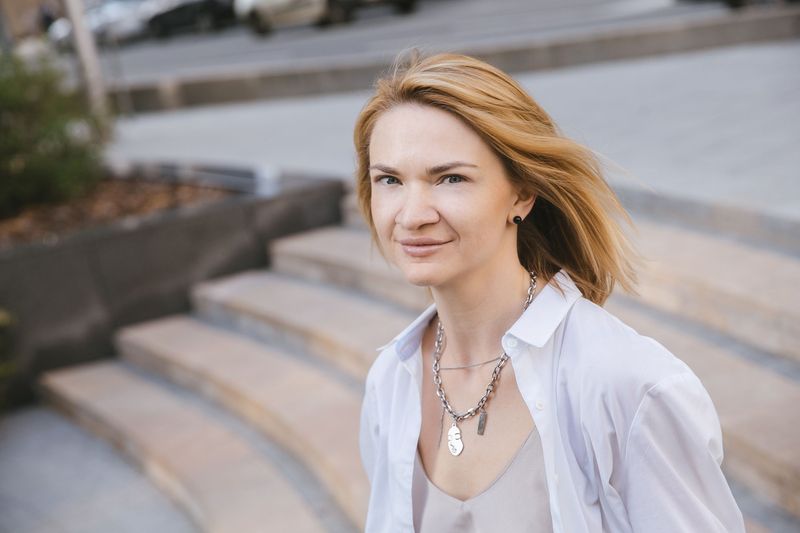“ICEF Taught Me to Think Globally”

Alena Shurtakova earned her bachelor’s from ICEF and her master’s from IE Business School in Madrid. In 2023 Alena completed her MBA graduate studies at Columbia Business School in New York and is currently employed as a consultant in McKinsey office in San Francisco. Here’s why Alena thinks international academic experience is a big benefit, why do an MBA, and how schools and businesses can facilitate human potential.
What prompted your choice of a finance major?
First, a family tradition. My two elder brothers did their degrees at ICEF. I followed in their footsteps and chose ICEF as where I’d be able to grow professionally and as a person. Like many applicants, I didn’t look far in the future. Finance looked a more applied career, and given that my parents had a family business at that time, my joining it as a finance specialist seemed a logical choice.
To me, the name of ICEF stands for top quality in finance education. Here, students learn profound math to be able to analyze and model the phenomena of economic dynamics. All courses are English-taught and form a curriculum that meets top international standards. ICEF is, in fact, Russia’s best provider of finance and economics education, and its graduates continue to enjoy high employability rates both domestically and abroad. I never hesitated about my choice.
What helped you make career choice and see where your skills would fit best?
ICEF provides a solid grounding in diverse aspects of finance. One important ability I learned here is to think globally. In my fourth year, however, while doing a course in securities and financial instruments in general, I realized I didn’t want to be in banking. It somehow seemed too abstract and far from what companies are facing in real-life situations.
I wanted a career path with close connection to business – somewhere I could see my actions yield tangible results
So, I started looking for a programme that would lead to it and discovered one, in management, in IE Business School in Madrid.
What attracted you to this degree?
International academic experience and the possibility to explore new cultures. This is that something that can give our abilities a tremendous boost. IE Business School has students from more than 80 countries and was a great chance for me to go international.
But first I went to the open day and talked to the students and the faculty to get myself prepared.
The thing I liked best about IE Business School was that it uses mostly case study method and teamwork –the teaching techniques that give knowledge and hands-on experience
When tasks get worked on through group work, not only do they give knowledge, they improve students’ communication skills and help them figure out their roles as team members, improving also soft skills.
IE Business School enjoys high international rankings. But, frankly, another reason why I chose was its location. Madrid is an incredible place to experience in Europe and wasn’t far to travel to. I had some Spanish skills from earlier, and although IE Business School teaches in English, it was my opportunity to practice my Spanish with the native speakers outside the campus.
How well did your training at ICEF meet the standards of your chosen European programme?
ICEF teaches its degrees in English, according to high international standards, which are assured also thanks to its international team. So, I felt I was perfectly prepared. Besides, I didn’t have to take IELTS or TOEFL and thus use my time preparing for the core curriculum. As to my level of knowledge, it appeared a way higher than that of my classmates, at least in Statistics, Economics, and Corporate Finance. My hard skills from ICEF had made learning pretty easy for me, so I focused more on business skills and soft skills.

At IE Business School, I teamed up with students from many different countries, each with their unique cultural experience, so I have first-hand experience of how this alters your worldview toward non-standard thinking, allowing you to achieve your potential. My experience at IE Business School proved a useful add-on to my skills from ICEF.
Your manager skills, where did you think they could benefit you most?
My initial plan was to join my parents’ business, and my studies at IE Business School were among other things designed at entrepreneurial skills – some of my classmates were eventually able to build solid businesses through venture capital. But life had its own plan for me and brought me to consulting.
The skills and knowledge gained at IE Business School did come very much in handy when I started a job as a consultant. I had come prepared. Knew how to work in a team and do performance analysis.
How did your consultant career start for you?
After my international experience, I started to feel cramped in our family business. I wanted to push the boundaries, be responsible for large-scale projects and surrounded by brilliant personalities. Consulting seemed to offer that and even more. But I can’t say I was prepared for the Big Three’s high working pace. Nor was I prepared for handling projects in multiple industries.
I chose retail and joined EY Retail Practice, spent four amazing years there, learned so much and met my best friends there, but in the end got burned out anyway. I had this feeling I’d stopped growing and there was nothing else for me to learn in the consulting field. So, I gave myself a year to reboot and get back to optimum productivity. I spend that year traveling and running consulting projects for non-profits. I even ran a half marathon and climbed a few 50-milers.

In between my travels, I did interviews with different companies and talked to people from multiple industries, so eventually I had the luck of meeting someone at McKinsey and things had suddenly worked out well for me. I got back to consulting and started to engage in projects with completely different industries.
What are the qualities of a good consultant?
The most essential ones include willingness and ability to learn new skills, be a flexible decision-maker and never think, “Things can’t get better than this”. A good consultant is the one who knows how to communicate with clients and present their idea in the most effective way.
Consulting is more than problem-solving. It’s about convincing others your solution will work
Why did you choose to do an MBA?
For me, my MBA had been the opportunity to gain new experience. I did it in New York at Ivy League University (Columbia University), and it had introduced me to people from different countries and backgrounds. I have always loved travelling. I have been to more than 60 countries. America’s business schools offer programs that are more fundamental in nature, with in-depth specialty courses and the courses that can be studied outside the core curriculum, because business schools are often parts of universities.
As a student of the University of California, I was able to use student exchange opportunities and had discovered, much to my surprise, that no two business schools were alike.
I studied also at the UC Berkeley West Coast campus, so it was a lot of travelling back and forth between San Francisco and New York
The people who do MBAs, as opposed to master’s graduates, are usually profound specialists with ample experience. They make classroom discussions productive and interesting to follow. With an MBA, you can try yourself in many different industries and over a short time. I spent my 18 months after MBA working for non-profits, starting an EdTech startup, launching a venture fund with my classmates, and selecting startups for the Berkeley SkyDeck accelerator. There was hardly a day when my business school didn’t have a top manager, startup founder, Nobel laureate or investor to give talks about their projects and success path.
About Alena Shurtakova:
Alena earned her bachelor’s from ICEF in 2013 and her master’s in Management from IE Business School in 2014. Between 2015 and 2019 Alena worked at EY Retail Advisory Practice, where her duties dealt with fast delivery service launch, agile implementation, and development of retail business start and expansion strategies for clients based in Russia and CIS-countries. In 2019, Alena joined McKinsey & Company. She did her MBA at Columbia Business School and HAAS School of Business UC Berkeley in 2023 and currently serves as a consultant in McKinsey San Francisco office, leading projects in innovation, education, and organization strategy.
After completing my MBA, I chose to go on with my career in consulting and joined McKinsey office in San Francisco. I like my high working pace and the scope of projects that I have with multiple industries.
I know that some of your projects are in education. What challenges do you face performing them?
I have long been interested in human potential and how employers facilitate growth in their employees. So, to learn more about specialist training, I did quite a number of courses in psychology and coaching at Berkeley and UC.
One of the key challenges facing companies today is how to attract and retain talent. The trend over the past few years has been for employees to put more value on self-development, flexibility in schedules, and room for creativity. It is now much easier to build your personal brand and freelance. And given the pace at which the world evolves today, skills and technologies get obsolete before you know it. So, keeping employees’ skills up to date remains a challenge with many employers.
My job is to design conditions that would create a win-win situation for companies and those who work for them
One particular project I am working on is in higher education and seeks to increase school-business interaction through hiring practitioners as teachers. Universities and businesses should be encouraged to team up for joint courses and greater flexibility in retraining and advanced training. I think that colleges should focus more on cultivating in their students the ability to learn and adjust to the changing market conditions by learning new skills. Committing to memory is a thing of past. It is much more important to keep your options open and to be a good communicator, for communication is the most essential way to use for coming across as a competent specialist.
What advice would you give yourself ten years from now?
Believe in yourself. Never compare yourself to others. Remember that one and same task can be achieved differently and there’s no one-fit-all solution. If you are young and have an idea, you definitely have all it takes to make it a reality.